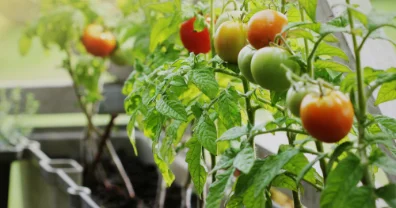If you like fresh vegetables, but do not have lots of room to grow them, a container garden could be right for you. You can choose what and how many vegetables you want to plant based on how much space you have. These can be grown anywhere that have the sun a good portion of the day. If you are an apartment dweller with a patio, you have room for a container garden. A nice size windowsill with direct sun could do for a small garden also.
When starting out you, may want to start small. Unless you are an experienced gardener, it might be best to try a few plants first to see how it goes. Most beginning gardeners do not know what they are getting into, and may make mistakes or take on more than they planned. Start with those plants that are easy to grow and do not require much work. Ask fellow gardeners or the experts at your garden center for advice.
Container gardens do require less work than gardening in the earth as you will not need to weed them. You may not have as many pests to deal with either. Sunshine and water are what your container plants will need most. When in the planning stages, make sure you take this into account.
Your first consideration is what vegetables to grow and whether to start from seeds or plants that have already been started for you. Seeds cost less but will have to be started sooner. You may have better luck with a starter plant provided you buy a healthy plant. Look at the appearance and make sure the buds are tight. The leaves should be green and firm. Buy from a reputable garden center and ask questions. Most employees like customers who ask questions as that means they are genuinely interested.
When deciding what vegetables to grow, think about what tastes best when freshly picked. Tomatoes, peas, onions, and salad greens of any kind are much better tasting when they are freshly picked. All of these are easy for the beginning gardener. You should also think about vegetables you may like, but are hard to find in your grocery store or farmers market. Many varieties are available that are container friendly. You could even experiment with produce you are unfamiliar with and expand your palate.
Think about your location for your containers also. How much sun will they get? Will you be able to water them with ease? If you have a place to attach a hose to water them, it will help immensely. If you have to use a watering pitcher, think about how much water you will need to carry to the plants every day. Tomato plants need a gallon of water every single day. That’s just one tomato plant; think about how much water you will have to haul if you have more. Not every plant needs quite this much water, but take it into consideration.
Most of your vegetables will require at least six hours of full sun daily. The more, the better when it comes to the sunshine. With less sun you will not get the size or quantity you could. Greens, carrots, and turnips grow better with less sun. They should have at least four hours daily. Keep in mind that the more sun you can give them, the better the crop. One advantage of a container garden is its portability. You can move them around to suit your and the plant’s needs.
When picking containers for your garden, bigger is more often better. Your plants may start out small but will quickly grow out of a smaller container. A larger container will also allow your vegetables to grow bigger and bear more produce. You also should look for containers with a reservoir for water in case you miss a watering. Look for containers that will hold at least eight inches of soil. For plants with a longer tap root such as carrots, go for 10 to 12 inches of soil.
Anyone can grow vegetables if they have a little bit of space that has direct sunlight a good portion of the day. The bounty will keep you eating healthy for a long time. Any extra vegetables you grow, you can preserve and can or freeze. Give some to your neighbors; they will appreciate the gesture. Many food banks will gladly take fresh produce for those in need also. Your produce will never go to waste.


Recent Comments